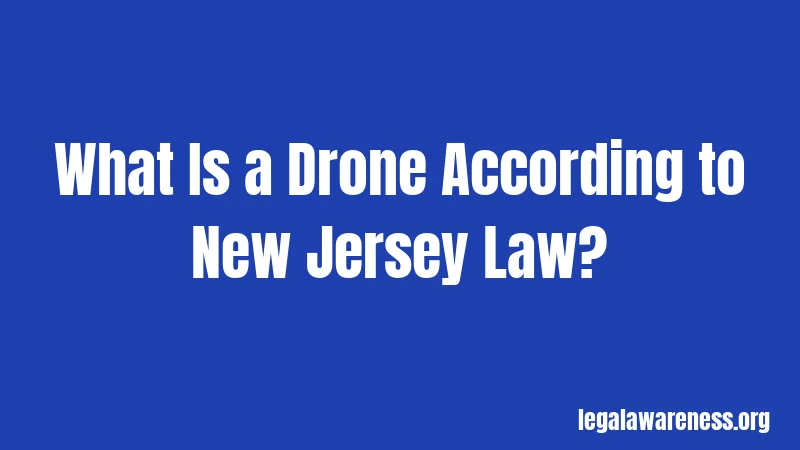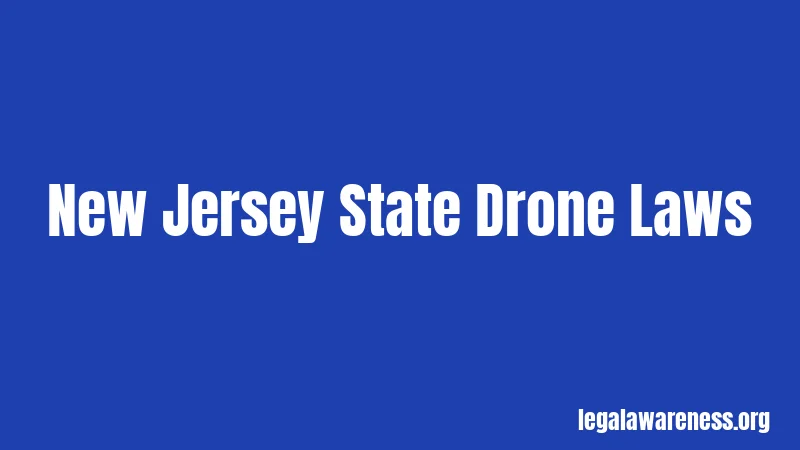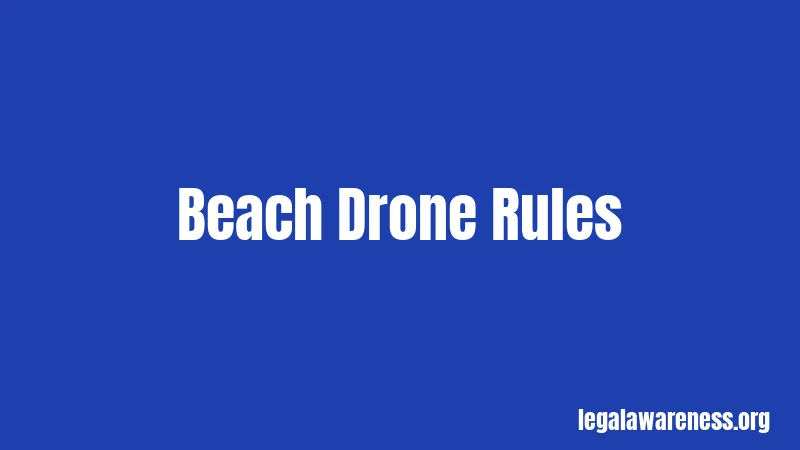Drone Laws in New Jersey (2026): Fly Smart or Pay Up
Most people think drones are just fun toys. They’re not. In New Jersey, breaking drone laws can land you in jail and cost you thousands of dollars. Seriously.
Whether you’re flying for fun or work, you need to know the rules. Let’s break down exactly what’s legal, what’s not, and how to avoid getting in trouble.
What Is a Drone According to New Jersey Law?

A drone is an unmanned aircraft. Pretty simple, right?
The official term is “unmanned aircraft system” or UAS. It includes the drone itself, the remote control, and any cameras or sensors attached to it.
If it flies without a person inside it, it’s a drone. Size doesn’t matter. Your tiny camera drone follows the same basic rules as larger commercial models.
Basic Federal Drone Requirements
Here’s the deal. Before we get into New Jersey-specific rules, you need to know the federal laws. These apply everywhere in the United States, including the Garden State.
Registration Rules
You must register your drone with the FAA if it weighs more than 0.55 pounds (250 grams). That’s about the weight of a deck of cards.
The registration costs $5 and lasts three years. You need to be at least 13 years old to register.
Your registration number must be visible on your drone. Don’t skip this step. Flying an unregistered drone can result in civil fines up to $27,500 and criminal penalties up to $250,000.
Recreational Flying Requirements
Flying for fun? You need to pass the TRUST test.
TRUST stands for The Recreational UAS Safety Test. It’s free and takes about 30 minutes online. The test covers basic safety rules and airspace restrictions.
Wondering if this applies to you? If you’re not getting paid to fly, you’re recreational.
Commercial Flying Requirements
Getting paid to fly changes everything. You need a Part 107 Remote Pilot Certificate.
This requires passing an FAA knowledge test. The test covers weather, airspace, regulations, and safe operations. Study materials are available online for free.
Commercial pilots also need to register their drones, no matter the weight.
New Jersey State Drone Laws

Okay, here’s where things get interesting. New Jersey has added its own rules on top of federal regulations.
Hold on, this part is important.
Operating Under the Influence
Never fly drunk or high. Period.
In New Jersey, operating a drone with a blood alcohol content of 0.08% or higher is illegal. The same goes for drugs.
This is called a disorderly persons offense. You could face up to six months in jail and a $1,000 fine. Think of it like a DUI, but for drones.
Honestly, this is common sense. But people still do it.
Endangering Life or Property
Flying your drone recklessly is a crime in New Jersey. If you endanger someone’s life or property, you’re breaking the law.
This is also a disorderly persons offense. Six months in jail. $1,000 fine. Both.
What counts as endangering? Flying too close to people. Losing control in a crowded area. Crashing into buildings. Use your head.
Correctional Facilities
Stay away from jails and prisons. Not even close.
Operating a drone near a correctional facility is a fourth-degree crime. This one’s serious. You could face three to five years in prison and fines up to $15,000.
The law covers “on the premises or in close proximity.” Don’t test how close “close proximity” means. Just stay away.
Using a drone to watch a correctional facility? That’s surveillance. Third-degree crime. Even more serious.
Interfering with First Responders
Never fly your drone near emergency situations. Police, firefighters, and paramedics need clear airspace.
Interfering with first responders is a criminal offense. If they’re responding to an emergency, keep your drone grounded.
Wait, it gets better. The law specifically prohibits operating a drone “in a manner that hinders the lawful taking of wildlife” too. Translation: no hunting with drones.
Where You Can’t Fly in New Jersey
Many places in New Jersey are completely off-limits for drones. Let me break it down.
State Parks and Forests
All New Jersey state parks ban drones. This includes state forests too.
The ban went into effect in 2015. It covers both recreational and commercial use. No exceptions for hobbyists.
You can apply for special permission from the Assistant Director of the State Park Service. But honestly, these waivers are rarely granted. They’re usually reserved for government agencies, emergency responders, and university research projects.
Popular parks like Island Beach State Park and Liberty State Park? Off-limits.
National Parks and Recreation Areas
Federal law bans drones in all National Parks. Period.
In New Jersey, this includes the Appalachian Trail, Delaware Water Gap, Ellis Island, Gateway National Recreation Area (including Fort Hancock), Great Egg Harbor River, Morristown National Historic Park, Paterson Great Falls, and Thomas Edison’s home.
The Statue of Liberty? Completely banned. The FAA placed a special restriction on this area in 2017.
Wildlife Refuges
The U.S. Fish & Wildlife Service prohibits drones on all Wildlife Refuge property. The main concern is disturbing animals, especially birds.
Drones can stress wildlife. They can also collide with birds. Stay away from these areas.
Military Bases
Flying near military installations is extremely dangerous and illegal. Joint Base McGuire-Dix-Lakehurst is a major military facility in New Jersey.
Don’t even think about it. Violating military airspace restrictions can result in your drone being shot down. You could also face federal criminal charges.
In 2020, two men were charged with conspiring to use drones to smuggle contraband into Fort Dix. They used drones to deliver marijuana, steroids, and cell phones into the prison. Not smart.
Temporary Flight Restrictions
Here’s where things get tricky. New Jersey has seen temporary flight restrictions in multiple locations.
In late 2024 and early 2025, the FAA banned drone flights in 22 locations across New Jersey. The restrictions cited “special security reasons.”
These temporary bans covered cities like Hamilton, Jersey City, Camden, and Elizabeth. They remained in effect until January 17, 2025.
Why the restrictions? Following mysterious drone sightings across New Jersey in late 2024. The FBI received over 5,000 reported sightings. Most turned out to be lawful commercial drones, law enforcement operations, or even manned aircraft and stars.
The restrictions for Bedminster and Picatinny Arsenal are permanent. Always check current flight restrictions before flying.
County and Municipal Restrictions
Most people don’t realize how strict local rules are. Many New Jersey towns and counties have their own drone ordinances.
Middlesex County: Drones banned in all county parks except designated areas.
Passaic County: You need a permit to fly in county parks.
Ocean Township: Drones banned below 400 feet except on private property with owner consent during daylight hours.
Long Beach Township: Launching and landing drones prohibited.
Franklin Lakes: Drones banned below 400 feet in most situations.
Point Pleasant Beach: Drones banned below 400 feet in designated “No Fly Zones.”
Basically, check your local town ordinances before flying. Seriously.
Beach Drone Rules

Can you fly on the beach? It depends.
Popular Jersey Shore beaches have seasonal restrictions. Summer months are usually off-limits. Too many people around.
Ocean City bans drone activity on the beach during summer unless it’s a permitted event or emergency response.
Less crowded beaches during off-peak seasons might allow drones. But you still need to follow FAA rules: don’t fly over people, stay within visual line of sight, and avoid restricted airspace.
Nesting birds are protected. Flying near bird nesting areas can result in fines. Wildlife disturbance is taken seriously.
How to Check If You Can Fly
Sound complicated? It’s actually not.
Use the B4UFLY app. It’s free and created by the FAA. The app shows you airspace restrictions in real-time.
Just enter your location. The app tells you if it’s safe to fly. Green means good to go. Yellow or red means restrictions apply.
Aloft Maps is another good tool. Many drone pilots use this for planning flights.
When in doubt, don’t fly. Or call the local police non-emergency line and ask. Better safe than sorry.
Recent Drone Sightings and Law Changes
You’ve probably heard about the drone mystery in New Jersey. Starting in November 2024, thousands of people reported seeing large drones flying at night.
The sightings occurred near sensitive areas like Naval Weapons Station Earle. People freaked out. Conspiracy theories spread. Some thought they were UFOs.
Federal authorities investigated. Most sightings turned out to be lawful drones, airplanes, helicopters, or even stars. No threat was found.
But the incident changed things. New Jersey updated its drone laws in 2025 to include stricter penalties for unregistered flights. The state also emphasized the importance of drone identification systems.
Right? This whole situation shows why following the rules matters.
Penalties for Breaking Drone Laws
Let’s talk about what happens if you break these laws. The consequences are no joke.
Federal Penalties
The FAA can impose civil fines up to $27,500 for recreational violations. For commercial violations, fines can reach $250,000.
Criminal penalties can include prison time up to 20 years for serious violations like interfering with manned aircraft or flying near airports.
Your Remote Pilot Certificate can be suspended or revoked. That ends your commercial drone career.
State Penalties
Disorderly persons offense: Up to six months in jail, $1,000 fine, or both. This applies to drunk droning and endangering life or property.
Fourth-degree crime: Three to five years in prison, up to $15,000 in fines. Flying near correctional facilities.
Third-degree crime: Three to five years in prison, up to $15,000 in fines. Surveillance of correctional facilities.
Local Penalties
Municipal fines vary by location. Ocean Township charges $250 for a first offense, $500 for a second, and $1,000 for third or subsequent offenses.
Other towns may have different fine structures. Some ban drones entirely and enforce strict penalties.
Privacy Laws and Drones
Using your drone to spy on people? That’s illegal.
New Jersey’s invasion of privacy laws apply to drones. You can’t capture images or videos of people in situations where they have a reasonable expectation of privacy.
Examples: Inside someone’s home. In a secluded backyard. Through bedroom windows.
Violating privacy laws can result in both criminal charges and civil lawsuits. People can sue you for damages.
Flying over your neighbor’s house isn’t automatically illegal. You don’t own the airspace above your property. But if you’re recording them in private areas, you’re breaking the law.
Restraining Orders and Drones
Here’s something most people miss. If you have a restraining order against you, drones are included.
Operating a drone within the restricted distance violates the restraining order. This is a separate criminal offense.
The law specifically states that using a drone to get around a restraining order is illegal. Smart move by lawmakers, honestly.
How to Fly Legally in New Jersey
Ready to fly the right way? Here’s your checklist.
Before You Fly
Register your drone with the FAA if it weighs more than 0.55 pounds.
Pass the TRUST test for recreational flying or get your Part 107 certificate for commercial work.
Check the B4UFLY app for airspace restrictions.
Make sure your drone has Remote ID capability. This is required for most drones as of 2023.
Check local ordinances for your specific location.
Check the weather. High winds and rain are dangerous.
During Your Flight
Stay below 400 feet altitude.
Keep your drone within visual line of sight. If you can’t see it, you’re breaking the rules.
Don’t fly over people who aren’t part of your operation.
Don’t fly over moving vehicles.
Give way to manned aircraft. Always. They have the right of way.
Don’t fly at night without proper authorization and lighting.
Avoid emergency situations. If you see police, fire, or ambulances, land immediately.
After Your Flight
Log your flight if you’re a commercial operator.
Check your drone for damage.
Review your footage to ensure you didn’t accidentally capture private areas.
What to Do If You See Suspicious Drones
Seeing a drone where it shouldn’t be? Don’t shoot it down.
Shooting down a drone is a federal crime under Title 18 of the U.S. Code Section 32. You could face up to 20 years in prison and fines up to $250,000.
You could also face state charges for criminal mischief or possession of a firearm for unlawful purposes.
Instead, note the time, location, and description. Report it to local police. If it’s near an airport or military base, call the FBI.
During the 2024 sightings, people called the FBI tip line. That’s the right approach.
Special Use Cases
Some situations have unique rules. Let’s cover them.
School Property
Many school districts ban drones on school grounds. This includes during school hours and events.
Some districts require superintendent approval. Check with the school before flying.
The New Jersey State Interscholastic Athletic Association (NJSIAA) banned drones at all outdoor high school sporting events. If a drone approaches, they’ll stop the game.
Real Estate Photography
Commercial real estate photography requires a Part 107 certificate. No exceptions.
You’ll also need permission from property owners. Insurance is highly recommended.
Some towns require additional permits for commercial drone operations. Check with your municipal government.
Special Events
Parades, festivals, and large gatherings often have temporary flight restrictions.
Event organizers may request FAA-approved restrictions. Always check before flying at public events.
Scientific Research
Universities and research institutions may apply for special permits to fly in restricted areas like state parks.
These applications require demonstrating both necessity and safety. They’re reviewed case by case.
Insurance Considerations
Drone insurance isn’t legally required for recreational use in New Jersey. But it’s a good idea.
Commercial operators should definitely have insurance. Many clients require proof of insurance before hiring you.
Liability insurance protects you if your drone causes property damage or injures someone. Policies typically start around $500 per year.
Some homeowners insurance policies cover small recreational drones. Check your policy.
Future of Drone Laws in New Jersey
Technology evolves fast. So do the laws.
Remote ID requirements went into full effect in 2023. Your drone must broadcast its location and identification while flying. Most new drones have this built in.
The FAA is working on rules for flying drones beyond visual line of sight. This could open up delivery services and long-range operations.
New Jersey will likely continue updating its laws. The 2024 drone sightings proved that more regulation is coming.
Congress is considering federal counter-drone legislation. This would give law enforcement more tools to identify and address drone threats.
Stay informed. Regulations change. What’s legal today might not be tomorrow.
Resources for Drone Pilots
Need more information? Here are the best resources.
FAA Drone Zone: Register your drone and find official FAA information.
B4UFLY App: Free app to check airspace restrictions.
New Jersey Motion Picture & Television Commission: For commercial filming permits and guidance. Contact them at [email protected].
Local Police Non-Emergency Line: Call before flying in a new area.
AirMap and Aloft: Commercial apps with detailed airspace maps.
Frequently Asked Questions
Do I need a license to fly a drone in New Jersey?
For recreational flying, you need to pass the free TRUST test. For commercial flying, you need a Part 107 Remote Pilot Certificate. Both require registration if your drone weighs over 0.55 pounds.
Can I fly my drone at the beach in New Jersey?
It depends on the specific beach and time of year. Many popular beaches ban drones during summer months. Less crowded areas during off-season may allow drones, but check local ordinances first.
Is it illegal to fly a drone over someone’s house?
Flying over someone’s house isn’t automatically illegal, but using the drone to record private areas is. You can fly in the airspace, but you can’t violate privacy laws by recording people in their homes or backyards.
What happens if I fly my drone drunk in New Jersey?
Operating a drone with a BAC of 0.08% or higher is a disorderly persons offense. You could face up to six months in jail, a $1,000 fine, or both.
Can I fly my drone in a New Jersey state park?
No. All New Jersey state parks ban drones. You can apply for special permission, but waivers are rarely granted to recreational pilots.
Final Thoughts
Drone laws in New Jersey are strict, but they’re not impossible to follow. Register your drone. Take the required tests. Check before you fly. Stay away from restricted areas.
The penalties are real. Jail time, heavy fines, and criminal records are all possible if you break the rules.
But flying legally? That’s actually pretty straightforward. Use the B4UFLY app. Follow the basic rules. Respect privacy. Stay below 400 feet.
Now you know the basics. Stay informed, fly safe, and when in doubt, keep your drone on the ground or ask a professional.
References
- New Jersey Senate Bill 3370 – Drone Operation Laws – https://pub.njleg.gov/bills/2016/S3500/3370_S1.HTM
- Federal Aviation Administration – Drone Registration and Rules – https://www.faa.gov/uas
- New Jersey Department of Environmental Protection – State Park Service Unmanned Aerial Vehicle Policy – https://www.nj.gov/dep/parksandforests/docs/dronepolicy.pdf
- UAV Coach – Complete Guide to New Jersey Drone Laws – https://uavcoach.com/drone-laws-new-jersey/
- Federal Aviation Administration – Temporary Flight Restrictions in New Jersey (2024-2025) – https://www.faa.gov
